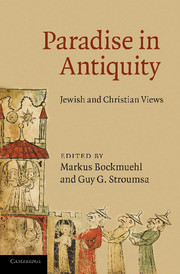Book contents
- Frontmatter
- Contents
- Notes on contributors
- 1 Introduction: the paradise chronotrope
- PART I PARADISES OF SECOND TEMPLE JUDAISM AND CHRISTIAN ORIGINS
- PART II CONTEMPORIZING PARADISE IN LATE ANTIQUITY
- 8 Tertullian's law of paradise (Adversus Judaeos 2): reflections on a shared motif in Jewish and Christian literature
- 9 The language of paradise: Hebrew or Syriac? Linguistic speculations and linguistic realities in late antiquity
- 10 The tree of life and the turning sword: Jewish biblical interpretation, symbols, and theological patterns and their Christian counterparts
- 11 Erotic Eden: a rabbinic nostalgia for paradise
- 12 Paradise for pagans? Augustine on Virgil, Cicero, and Plato
- 13 Heaven as a political theme in Augustine's City of God
- 14 Locating paradise
- 15 Epilogue: a heaven on earth
- Select bibliography
- Index of subjects
- Index of authors (cited in text)
- Index of sources
12 - Paradise for pagans? Augustine on Virgil, Cicero, and Plato
Published online by Cambridge University Press: 06 December 2010
- Frontmatter
- Contents
- Notes on contributors
- 1 Introduction: the paradise chronotrope
- PART I PARADISES OF SECOND TEMPLE JUDAISM AND CHRISTIAN ORIGINS
- PART II CONTEMPORIZING PARADISE IN LATE ANTIQUITY
- 8 Tertullian's law of paradise (Adversus Judaeos 2): reflections on a shared motif in Jewish and Christian literature
- 9 The language of paradise: Hebrew or Syriac? Linguistic speculations and linguistic realities in late antiquity
- 10 The tree of life and the turning sword: Jewish biblical interpretation, symbols, and theological patterns and their Christian counterparts
- 11 Erotic Eden: a rabbinic nostalgia for paradise
- 12 Paradise for pagans? Augustine on Virgil, Cicero, and Plato
- 13 Heaven as a political theme in Augustine's City of God
- 14 Locating paradise
- 15 Epilogue: a heaven on earth
- Select bibliography
- Index of subjects
- Index of authors (cited in text)
- Index of sources
Summary
Who shared paradise in late antiquity? Was it only for Jews and Christians who shared a sacred text, or did pagans too have a dream of paradise as it had been and as it would be? This question can be approached through two of the most influential writers in western tradition: Virgil the classical poet and Augustine the Christian theologian. Augustine had good reason to take Virgil as the representative of Roman culture and belief. For Latin speakers of the late fourth century, education was based on Roman classical authors of four or five centuries earlier. Everyone who could afford more than primary education read some Virgil, and in later life could evoke this shared culture by references to him. Augustine himself read Virgil as a schoolboy, taught Virgil in his years as a grammaticus, and knew how teachers could use Virgil as the basis for instruction not only in literature and history, but also in religion. Commentaries (commentarii) began as lecture notes on the text that students were reading, and in the surviving commentary by Augustine's contemporary Servius, there are historical explanations of Virgil's references to Roman religious tradition and philosophical interpretations of the truths symbolized by myths and cults. Such lectures might be the only religious instruction available to pagans, unless they went on to study philosophy, for temples and priests did not provide teaching.
- Type
- Chapter
- Information
- Paradise in AntiquityJewish and Christian Views, pp. 166 - 178Publisher: Cambridge University PressPrint publication year: 2010
- 1
- Cited by



